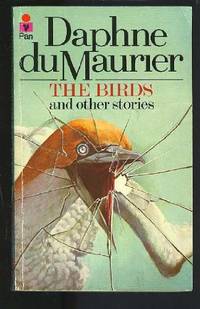Book #46: The Birds and Other Stories by Daphne du Maurier

Number of pages: 239
This is a collection of six short stories and novellas by Daphne DuMaurier.
The first is the most well-known, The Birds, but I noticed that it bore very little resemblance to the Alfred Hitchcock movie that is based on it, not least because it doesn't feature the character played by Tippi Hedren. The story revolved entirely around a family living in a farmhouse, who I presumed were the same characters who gave Tippi Hedren refuge at the end of the movie, and much of it did resemble the movie's final scenes. No explanation is given for why the birds attack, making it very much like a Stephen King novel, and I noticed the ending managed to be bleaker than it was in the movie, and seemed deliberately ambiguous.
The second tale, Monte Verita was also the longest, and opened with the narrator telling of the death of his friend Victor, before flashing back to Victor's marriage to a woman who shared his passion for hillwalking, leading to them attempting to climb the titular Monte Verita. The story turned into a dark fantasy involving the wife's disappearance, apparently brainwashed by a myserious (and apparently supernatural) cult supposedly living on the mountain; it led to a particularly gruesome climax.
The third story was The Apple Tree, telling of a man who has just lost his wife. I got the impression from reading that the character hadn't particularly liked his wife, and wasn't sure if he was meant to be sympathetic character, as the story occasionally flashed back to scenes from their marriage. Also, the supposedly dead apple tree in the garden starts flowering, with apples inexplicably growing on it, but when he eats the apples it turns out that they are completely inedible. I really had no idea where this was going, and the ending was shocking, and completely unexpected. The story seemed open to interpretation, but I started to think that somehow the tree was a reincarnation of his dead wife, getting revenge from beyond the grave.
This was followed by The Little Photographer, involving a "marquise" forming a friendship with a man who wants to use her as a photographic muse, but their friendship starts to feel like an affair. As with the previous story, I had no idea where it was heading, and I did not expect it to take a sudden lurch into a Hitchcock-style suspense tale. The ending felt a bit ambiguous though, and I wondered if I'd missed something, so I may have to re-read this one.
The final two stories were the shortest. Kiss Me Again, Stranger was told from the point of view of a man who dated a cinema usherette. Things started to get bleak half way through on their date, and I started to think I could guess how it would end. But, I missed an obvious clue as to what would happen (all I'll say was it involved an RAF pilot), and the plot went in a completely different (but equally shocking) direction to what I thought it would.
The final story, The Old Man is told to the reader in the second person, and feels like a rear-window type story about the narrator watching the "old man" with his wife and family, and watching his children grow up and leave home, before the plot starts to get shocking. The story is written in such a way that the reader only finds out on the final page that things weren't quite as they seem. The truth is...
[Spoiler (click to open)]
While the obvious assumption was that the "old man" and his family were humans, this proved to be very wrong. So, after a shocking plot that seemed to be about a man turning his son out of the house and then killing him when he wouldn't leave, it turned out that the narrator was watching a family of swans. I never saw that coming.
These stories were written over 50 years ago now, but I found them relatively easy to read, and I loved the way that Daphne DuMaurier played with the reader's expectations and threw in something that few people could possibly have seen coming.
Next book: Why We Sleep: The New Science of Sleep and Dreams (Matthew Walker)